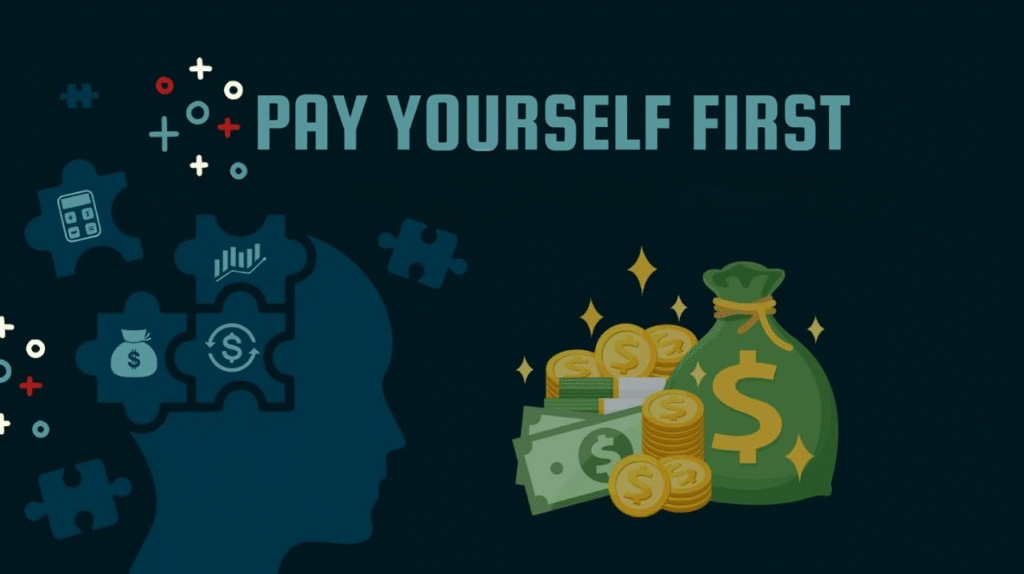Your savings account grows without you thinking about it when you do something ridiculously simple called paying yourself first. It’s about flipping the script on how you think about money – putting your future self at the front of the line instead of at the back. We’re going to break down exactly why this works and show you how to set it up with the assistance of Money Coach Hana Al Hinai, who’s teaching young professionals to master this money move.
Why Pay Yourself First Actually Works
Set aside money for savings the moment your paycheck hits your account.
• Future First: Instead of hoping there’s money left over for dreams, you make them happen first.
• You Become Money-Smart: When saving isn’t optional, you naturally get better at making your remaining cash stretch.
• Reduces Stress: Money stashed away for an emergency keeps you cool.
• Your Money Multiplies: The earlier you start saving, even small amounts become impressive piles of cash.
Financial guru Robert Kiyosaki once said, “It’s not how much money you make, but how much money you keep.” This is intentional living at its finest. When you pay yourself first, you’re not just saving—you’re building long-term peace of mind.
The Pay Yourself First Playbook
Here’s how to make it happen:
1. Start Small, Think Big
• What to Do: Pick a plausible percentage to save.
• Why It Works: A manageable goal makes it easy.
• Tip: Adjust as needed, and increase it gradually.
2. Set It and Forget It
• What to Do: Set up automatic transfers for payday.
• Why It Works: The money disappears before you can spend it.
• Tip: Treat it like a bill.
3. Create Separate Savings Accounts
• What to Do: Don’t just dump everything into one account.
• Why It Works: It keeps your savings organized.
• Tip: Name them something that gets you excited.
4. Level Up Each Year
• What to Do: Resist the urge to upgrade your lifestyle—pay yourself first by increasing your savings rate instead.
• Why It Works: Tiny tweaks today become massive wins tomorrow.
• Tip: Any extra cash is directed into savings.
Meet Money Coach Hana Al Hinai: Revolutionizing Young Professionals’ Finances
To make this work in real life, interact with Money Coach Hana Al Hinai, who has cracked the code. She’s spent years studying the psychology behind money habits, figuring out why some people nail their money goals while others keep starting over every January. Her insights reveal the hidden patterns that separate financial winners from perpetual restarters.
Here’s what makes Hana different:
• She Makes It Stick: Hana starts people with baby steps that actually feel doable, then helps them build from there.
• She Handles the Tech Stuff: Hana walks people through every click and shows them how to organize their money like a pro.
• She Thinks Beyond Piggy Banks: She teaches them the nuances of smart investing. The proof is in the results.
She does it all online, so geography doesn’t matter. Her digital approach breaks down all the usual barriers that keep people from getting proper money coaching. Financial freedom is just one good habit away—and it starts when you pay yourself first.
Your Financial Freedom Starts When You Pay Yourself First
It’s not about the money sitting in your account, but waking up one day and realizing you’re not scared of your bank balance anymore. It’s about making choices because you want to, not because you have to. When you automate your savings and stick with the plan, your “what if” moments shift to “no big deal” moments.
Money Coach Hana Al Hinai has seen hundreds of people transform from financial stress cases to people who actually enjoy checking their bank accounts. Her approach isn’t about deprivation, but building a system that works while you’re busy living your life. To stop letting money control your decisions, head over to www.smartmoneyeducation.com and see what’s possible when you pay yourself first and put yourself at the front of the financial line. The time to start isn’t tomorrow or next month – it’s today.

